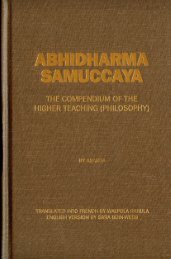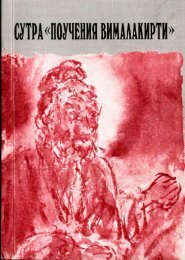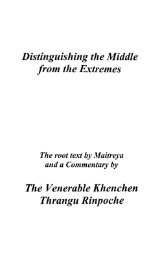ABHISAMAYALAMKARA
ABHISAMAYALAMKARA
ABHISAMAYALAMKARA
You also want an ePaper? Increase the reach of your titles
YUMPU automatically turns print PDFs into web optimized ePapers that Google loves.
122 ANALYSIS OF<br />
1<br />
S t e a d f a s t n e s s , 5. the A c c u m u l a t i o n of<br />
E n e r g y, 2 6. t h e A c c u m u l a t i o n of Conc<br />
e n t r a t i o n , and 7. the A c c u m u l a t i o n of<br />
3<br />
H igh est W i s d o m . — 4<br />
THE <strong>ABHISAMAYALAMKARA</strong><br />
[Abhis. aloka, MS. 66b. 4—67a. I.]<br />
123<br />
laslftji lam~la rah-lu hgod do. = Dutt, 187. 21-22.—Again, O<br />
Subhuti, the Bodhisattva, the Mahasattva, who abides in t h e<br />
practice of the Climax of Morality is possessed<br />
of regard (for the living beings). And, having assumed a state<br />
of existence (in this world) he becomes born in a race of universal<br />
monarchs (cafyravartlrif and, having become a universal sovereign<br />
(himself), he leads the living beings to the Path which is characterized<br />
by the practice of the 10 virtues.—<br />
1 Ibid. 200b. 3-6.—Rab-hbyor gzan-yan byan-chen bzod-pahi<br />
pha-rol-tu-phyin-pa~la gnas-te.........na-rgyal sems-can thams-cad bdagla<br />
rdo dan dbyug-pas brdegdn mtshon-gyis hdebs-kyan de-la bdag-gis<br />
hfyhrug-pahi setns. hgah-tsam-yah bsfyyed-par mi-byaho, =Dutt, 188.<br />
11-12.—O Subhuti, the Bodhisattva, the Mahasattva, who abides<br />
in the practice of the Climax of Patience<br />
(or Steadfastness), thinks :—All the infatuated living beings may<br />
beat me with stones, and sticks and wound me with their weapons,<br />
but nevertheless, I will not, in anycas, give way to an irritated<br />
mind.-—<br />
2 Ibid. 201a. 3-4.—Rab-hbyor gzan-yah byan-chen brtsonhgrus-k,yi<br />
pha-rol-tu-phyin-pa-la gnas sin sems-can thams-cad brtsonhgrus-kyi<br />
pha-rol-tu-phyin-pa-la hshul zin gzag-go. = Dutt, 189. 1-2.<br />
—Again, O Subhuti, the Bodhisattva, the Mahasattva, who abides in<br />
the practice of the Climax of Energy, incites all the<br />
living beings to practise the said virtue and supports them (in this<br />
practice).—<br />
3 Ibid. 201b, 3-4.—Rab-hbyor gzan-yah byan-chen bsam-gtan*<br />
gyi pha-rol-tu-phyin-pa~la gnas sin sems-can thams-cad bsam-gtangyi<br />
pha-rol-tu~phyin-pa-la yan-dag-par-b&kjul. zin gzag-go. = Dutt, 189.<br />
10-11.—Again, O Subhuti, the Bodhisattva, the Mahasattva, who<br />
abides in the practice of the Climax of Concentration,<br />
incites all living beings (to follow him in this<br />
practice) and supports them.—<br />
4 Pane. I. 202a 7-lb* I.- 5 —-Rab-hbyor hdi-!a byan-chen ses-rab-<br />
1%yi pha-rol-iu-phyin-pa-la spyod-pahi ishe chos gan-yah skyebaham.<br />
hgag-paham. \un-nas-ncn-mohs-paham. tnam-par-hyan<br />
baham tshu-rol-tam pha-rol mi-dmigs-te. Rab-hbyor de-ltar byan<br />
chen ses-~rab~kyi pha-rol-iu-phyin-pa-la gnas-pa yin-te. =Dutt, 189.<br />
23—O Subhuti, the B. M. who acts in the field of the Climax of<br />
Wisdom does not perceive any of the elements of existence as<br />
becoming originated, as disappearing, as defiling or purifying, and<br />
as relating to this or to the other world. In such a manner, Q<br />
Subhuti, the B. M* takes his stand in the Climax<br />
b'i-- Wisdom. - - • _ • • • • • • • -... .,<br />
i f% i =^r ^Rrft^ f^ (46a.). "<br />
[Tg. MDO. VI. 65b. 2-8.]^snin-rtse-ba dan-bral zin<br />
thabs dan~mi~ldan-pas ni gzan-rnams hgah-zig k.V an mya-hanlas-bzla-ba<br />
mi~srid~pahi-phyir-te. snin-rje \)id-gduh$-pa~mams<br />
sbyin-pahi pha-rol~tu~ph\)in-pas hdas-pahi dus-kyi 1 bde~ba<br />
ne-barsgrub-pa dan. tshul-khrims-liyi phd-rol-tu-phyin-pas mahons-pahi<br />
bde-ba fie-barsgrub-pa dan, bzod-pa dan spro-ba<br />
dan sems-rise-gcig-pas hbras-bu gcig~tti~nes-p(f thob-pa-yinpahi<br />
ph\)ir. bzod-pa dan. brtson-hgrus dan. bsam-gtan-gyi p/iarol-tu-phyin-pa-mams-kyis<br />
gcig-ia-hes-pahi bde-ba ne-bar^sgrubpa<br />
dan. ses~rab-kyi pha-rol~tu~phinn-p®s gtan-du-bahi bde-ba<br />
ne-bar-sgrub-pas-na. thabs-sa-gpur-pa sbyin-pa-lasogs-pa pharol-ta-phyin-pa<br />
drug~po~mams~kyi$ rjes-su-bzuh-nas bdag-nid<br />
pha-rol-tu-phyin-pa drug-la gnas-pa dan-hdra-bar. de-nid-layan-dag-par-sbyor-ba<br />
dan hjog-pa dan rab-tu hjog-pas mi-gyelbas<br />
rab-tu-gzag-par-byaho. zes-bya-ba ni don-gyis Jiphahspa<br />
yin-no. zes brjod-pa pin~no. de-ltar-na tshogs bdun bstan-*<br />
par gpur-pa \}in~te. hdi-ltar snin-rjehi tshogs dan. sbyin-pahi<br />
tshogs dan. tshul-k,hrims-kyi tshogs daft, bzod-pahi tshogs dan.<br />
brtson-hgrus-kyi tshogs dan. bsam-gtan-gyi tshogs dan. ses-rabkyi<br />
tshogs-so.<br />
We have next:—-<br />
8. Tlie Accumulation of Mental<br />
Quiescence (or of Mind-concentration). The latter<br />
1 This translation of tadatva seems strange. Gser. (I. 295a. 5.):<br />
dits dehi bde-ba.'<br />
2 Gser. I. 295a. 6.— hbras-bu-gcig-tu-nes-pa rgyu dan-rjes-sumthun-pa<br />
k.ho-na hgrub-pas.-—As they bring about the definite<br />
result, just that which is conformable with the causes. This is<br />
opposed to the "illimited* bliss mentioned in connection with the<br />
Climax of Wisdom.<br />
j<br />
^


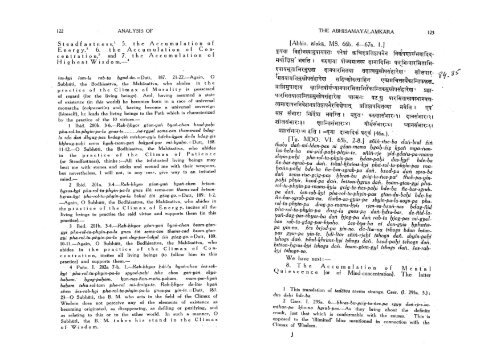

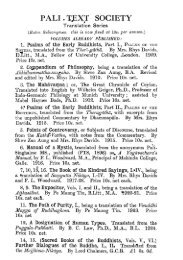






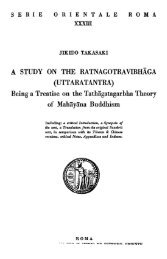
![Long Discourses of the Buddha [Digha Nikaya]](https://img.yumpu.com/32792419/1/164x260/long-discourses-of-the-buddha-digha-nikaya.jpg?quality=85)
